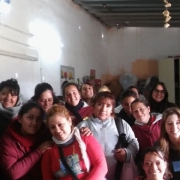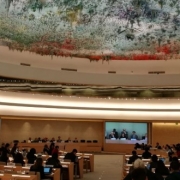We participate in the First Feminist Economy Day
Durante los días 6 y 7 de Septiembre se desarrolló en la Facultad de Ciencias Económicas de la UNC la XII Jornada de Economía Crítica y la I Jornada de Economía Feminista
“Below, we offer a google translate version of the original article in Spanish. This translation may not be accurate but serves as a general presentation of the article. For more accurate information, please switch to the Spanish version of the website. In addition, feel free to directly contact in English the person mentioned at the bottom of this article with regards to this topic”.
During the First Feminist Economy Conference, in which different themes related to feminist perspectives of the economy and the main issues of women in the current system were presented, we present the work “Care and (equal) opportunities for women in media companies and advertising agencies. ”The presentation analyzed the impact of care tasks on women workers in these sectors in Buenos Aires and Córdoba.
The work was based on research “Media organizations and gender: Equal opportunities for women and LGBTQ + people in companies, unions and universities” and “Advertising sector and gender: Advertising agencies, associations, unions and educational institutions analyzed with a feminist perspective ”That we carry out together with the Civil Association Communication for Equality with the support of the Heinrich Boll Foundation. One of the relevant points of the research focuses on the analysis of the distribution of care tasks.
According to official data, 88.9% of women participate in unpaid household chores, to which they dedicate 6.4 hours a day, while 57.9% of men declare having done them for a total of 3.4 hours . These figures show the rigid sexual division of labor that affects the professional development of women compared to their male peers. This reality is reproduced in all work areas and advertising agencies and media organizations, objects of our research, are no exception.
This prevailing inequality is, in turn, the product of the absence of public and / or business policies to mitigate the impact. According to the data investigated, in the media companies of Córdoba, the number of women hired under a fixed term, part-time or who are monotributistas, in relation to the total number of women is 10% higher than men, and the percentage of women who enter the media through internships is 57.14% more than men. This data includes the general picture that affects women (and diverse and dissident identities) in terms of their precariousness and job instability.
Surprisingly, the advertising industry shows a high percentage of hiring in dependency ratio (90%) and full time. Contracts with freelance mode or under the monotax regime, as well as part-time ones, are recorded in a low proportion. However, the home work format is identified on a small scale and is never formalized. In this sense, it is important to highlight how the implementation of this type of work is linked to care tasks. Well, although they are proposed as positive forms of labor flexibility, they result in precarious ways that mainly affect women, since it allows them to “reconcile” this work with the domestic one.
In view of this unfavorable panorama, the care policies in force in both industries reproduce the imbalances that exist at a general level in their allocation and distribution, especially affecting the autonomy of women, reducing their opportunities for professional development, becoming a fundamental factor in the perpetuation of gender gaps. This is because they reproduce the sexual division of labor and cover only women workers in a dependency relationship. This becomes problematic if we remember that it is women who have a higher rate of labor informality.
Both in media companies and in advertising agencies, the measures taken in relation to care are limited to following the provisions of the law, such as the granting of licenses, especially to women mothers during the early childhood of their children . However, we notice poor compliance with policies such as lactaries and nurseries. There are policies developed by companies that compensate for non-compliance with regulations with specific and informal reconciliation practices with different levels of flexibility. Some of them, we could consider them as exceeding the law, such as specific licenses, possibility of working from home or flexibility in the time of entry and / or departure, extension of the license without pay or the progressive reinstatement with enjoyment Of salary. In this context it is worth mentioning that, although these initiatives exist, some of them, such as home office, are scarce and respond to specific requests of each worker, with the majority being women who request them. After having participated in the historic first Feminist Economy Day in Córdoba, we celebrate the realization of these meetings where it is possible to rethink, discuss and deconstruct, from feminist currents, economic inequality, inequality of opportunities, discrimination and sexual division of job.
Authors
Ivana Sánchez and Luz Baretta
Contact
Cecilia Bustos Moreschi







